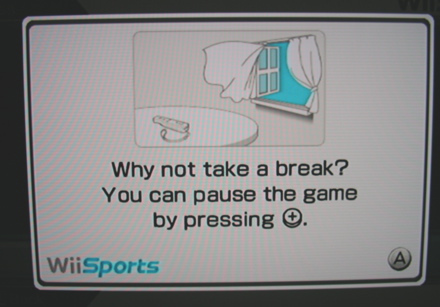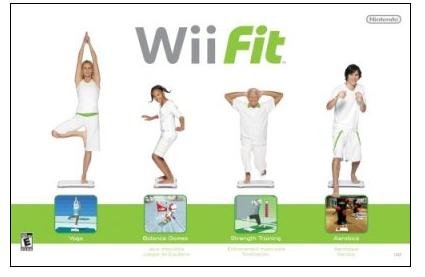Nintendo Wii
Video games are for nerds. Right? Nintendo's Wii entertainment system seems to be taking a slightly different stance on the role of a video game console.When I first got a Wii console, I was immediately confronted with the following screen:

This is just one example of how the Wii puts the user first and their game second through the use of Cognitive Dissonance. From a users standpoint this screen presents some interesting dissonance. When I decide to play a video game, the last thing I need is someone besides my girlfriend telling me to turn off the Nintendo-- now my Nintendo is telling me to turn it off! Am I being lazy by playing a video game? Should I be doing something more productive? While this use of cognitive dissonance is effective, I am not sure what Nintendo's goal is by including these types of messages. Maybe get some mothers to purcahse a Wii instead of an XBox 360.
In 2008, Nintendo introduced the Wii Fit-- a product designed to get it's users to become more physically healthy.

The Wii fit also uses cognitive dissonance, but this time in a more "pro-wii"/"pro-play" manner. More clearly, this use of CD makes the user want to minimize the dissonance by using the Fit more often. Below is a screenshot of the Fit system.

As you can see, the system is telling the user that they are "Overweight." WOW! First my system is telling me to take a break from using it, and now its telling me that I'm overweight and almost "Obese". Obviously the user is going to feel bad about this and two one of two things: 1) Turn off the system because they dont want to be called Obese, or 2) Continue to use the Fit in order to get their weight down.
Operant Conditioning
From my expereience the Wii system (not its games) does not make explicit use of Operant Conditioning. For example, rather than displaying the "Why not take a break" at random intervals, perhaps the system could display this after an hour or more of game play. The system would then give the user some time to play before discouraging of the system (negative reinforcement).The Wii Fit product is an example of one big Operant Conditioning. The system uses several visual cues to encourage the user to continue use. For example, the visual appearance and size of the user's avatar is directly related to how well you play the game and what your current BMI score is. By displaying the users weight category and an accurate avatar, the system hope to encourage the user to make their profile a little more healthy.